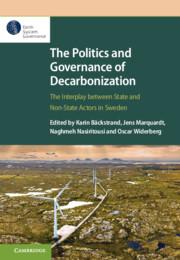Climate change poses an unprecedented threat to societies around the world. Yet, more than 30 years of international climate diplomacy and governmental action have failed to sufficiently curb the climate crisis. The implementation gap brought renewed attention to the role of the state in governing toward decarbonization by orchestrating and mobilizing non-state and sub-state climate action in a multilevel governance context.
This book provides essential answers to how and under what conditions states – in collaboration with societal actors – can steer and govern in order to accelerate the large-scale decarbonization that is needed to reduce greenhouse gas emissions in line with the goals of the Paris Agreement. The particular focus of the book is on the interplay between state and non-state actors in Sweden, which announced its goal to transform itself into one of the world’s first fossil-free welfare states at the United Nations climate summit in Paris in 2015. The book advances an innovative analytical framework and presents novel empirical insights on how the state governs through collaborative climate governance, which is a mode of governance that aims to foster collaboration, deliberation, and consensus between state and non-state actors.
This volume is the outcome of findings of a three-year international research project titled Climate Action in the Post-Paris Landscape: The Role of Non-state Initiatives in the Transformation of Sweden into a Fossil-Free Welfare State (ACTS 2017–01889), which was funded by the Swedish Research Council for Sustainable Development (Formas). The project has been coordinated by Karin Bäckstrand at Stockholm University and involves researchers from Linköping University, Vrije Universiteit Amsterdam, Technical University of Darmstadt, and the Swedish Institute for International Affairs. In addition, Formas funded a 12-month project titled Climate Action in a State of Crisis: How Swedish Collaborative Climate Change Initiative Managed to Navigate through the COVID-19 Pandemic (2020–02865). This project was coordinated by Jens Marquardt and subsequently by Karin Bäckstrand after he relocated to Germany. The book was also funded by the MISTRA GEOPOLITICS program funded by MISTRA – the Swedish Foundation for Strategic Environmental Research. Chapter 8 was supported by the Formas project Whose Transformation? The Places, Politics and Ethics of the Fossil-Free Society (2019–02012), which is coordinated by Eva Lövbrand. We extend our warmest thanks to Anna Bohman, Johan Gärdebo, and Clifton Evers for their important contributions to data collection and curation for Chapter 8. We are immensely grateful to Formas for giving us the opportunity to carry out the important and innovative research that we present in this book. We are particularly indebted to Katarina Buhr at Formas for her swift and helpful feedback on project funding, administration, and reporting.
The idea to produce a joint edited volume first arose in the spring of 2021. In November 2021, we kicked off by discussing the first draft chapters at a two-day workshop at Fågelbrohus hotel in the Stockholm archipelago with several members of the Scientific Advisory Board of the ACTS project. We are deeply grateful to Michele Betsill (Copenhagen University), Andreas Duit (Stockholm University), Karolina Isaksson (Swedish National Road and Transport Institute), and Björn-Ola Linnér (Linköping University) for their excellent and constructive feedback in the early stages of the book. The process of writing this book over almost two years has been a stimulating, fruitful, and intense academic journey and conversation (and a roller-coaster ride), which has cut across and bridged different scholarly fields such as international relations, Swedish politics, climate policy, environmental politics, and the governance of decarbonization. In May 2022, we presented revised book chapters at the Environmental Politics, Policy and Learning (EPPLE) workshop at Djurgården in Stockholm. We want to express our gratitude to our fellow discussants Matthew Paterson and Paul Tobin from Manchester University, who provided excellent feedback that helped us to improve the contributions to this book.
As editors, we have been privileged to work with a great group of authors: Cornelia Fast, Veronica Gyberg Brodén, Eva Lövbrand, and Matilda Miljand. We extend our sincere gratitude to them for their collegial spirit, critical input, helpful advice, and tremendous patience – not only with respect to their own chapters but also for their invaluable support in improving the overall quality of the entire book.
Likewise, this volume would not have been possible without the helpful input from a wide range of people. This begins with the editorial team at Cambridge University Press, in particular, Maya Zakrzewska-Pim, Emma Kiddle, Sarah Lambert, and Matt Lloyd, who have all offered their dedication and guidance during the process of writing this volume. We would also like to take this opportunity to thank the three reviewers from Cambridge University Press. They challenged us to further clarify and sharpen the book’s theoretical, methodological, and empirical contributions, helping us to advance the research frontier on the interplay between state and non-state actors in the politics and governance of decarbonization.
We would also like to express our thanks to a number of colleagues who have dedicated their time to provide valuable feedback at various stages over the past two years. They all helped us to make significant progress in completing this volume. The following colleagues have offered very constructive feedback to specific chapters: Mikael Karlsson, Daniel Lindvall, Frida Öhman, Laila Mendy, Sverker C. Jagers, Jens Ergon, Oskar Lindgren, and Eva Alfredsson at Uppsala University; Markus Lederer, Dorothea Schoppek, and Timo A. Richter at Technical University of Darmstadt; and participants of the Higher Research seminar at Gothenburg University in September 2022.
Finally, we are indebted to Matilda Miljand at Stockholm University for her dedicated and helpful editorial assistance and creative design of the figures. We are also grateful to Matthew Collins for his meticulous and careful proofreading of the manuscript.
As editors, we take full responsibility for any errors or omissions in the book.

